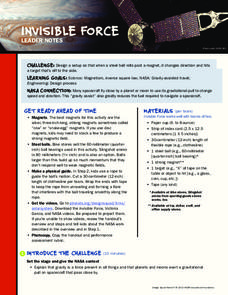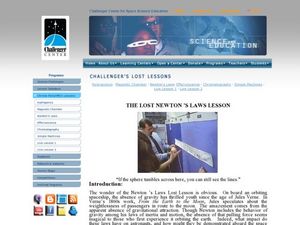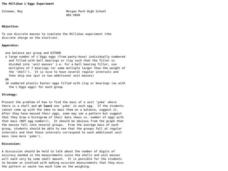TryEngineering
Getting Your Bearings
Students study friction and how the ball bearing was improved upon to increase efficiency. In this friction lesson students work in groups to complete an activity and worksheet.
Curated OER
Let It Roll
Students experiment in order to see how ball bearings work. In this science activity lesson, students conduct an experiment where they make and examine a ball bearing. Students brainstorm other examples of ball bearings and discuss...
Curated OER
Wheels and Axles 1
Young scholars investigate how and why wheels are used in different types of machines. They work in teams trying to move a heavy box with and without dowels and discuss which way is easier to move the box. Next, they conduct an...
Curated OER
Ball Bearing Roller Coasters and Teamwork Lab
Students discuss potential and kinetic energy and design roller coasters to study this concept. In this energy lesson, students discuss the potential and kinetic energy of a roller coaster. Students design roller coasters and hypothesize...
Curated OER
Impulse, Momentum, and the Conservation of Momentum
What happens when two worlds collide? In the first of several activities, future physicists experiment with colliding ball bearings or Newton's cradle. Another activity requires the use of an air track with cars to examine collision....
PBS
Invisible Force
Investigate invisible forces. Young engineers design a setup that changes the direction of a steel ball using a magnetic force. The purpose of the setup is to model the gravitational pull of spacecraft by planetary bodies.
Curated OER
The Lost Newton's Laws Lesson
Students explore momentum. In this physics lesson, students perform an experiment in which two balls are released on slanted boards while students observe which ball will go the farthest and the fastest. Students define and explain...
Curated OER
Look At Those Leaves!
Kids observe, classify, and measure tree leaves with a scientific eye. They examine leaves, group them according their attributes, and use standard units of measurement as they compare their sizes. They access a web site to learn how...
Teach Engineering
Exploring Energy: Energy Conversion
The energy is not really lost, it is just converted to a different form. Pupils learn about the conversion of energy in the fifth segment of an energy unit with six parts. Learners develop an understanding of the conservation of energy...
Agriculture in the Classroom
Six Kinds Do It All
Teach young engineers that all machines, no matter how complicated or complex, are made up of just six simple devices with this hands-on physical science lesson. Using the included templates, students first create paper models of...
Virginia Department of Education
Structure and Function of Cell Membranes
Lead your high school class on an exploration inside the cell. Individuals investigate the relationships between cells structure and function given their relative locations on the cell membrane. They explore the concept of homeostasis...
Curated OER
Roller Coasters
Twisting and turning through the sky, roller coasters are popular attractions at amusement parks around the world, but how exactly do they work? Explore the physics behind these thrilling rides with an engineering design activity....
Curated OER
Creating Impact Craters
Sixth graders simulate the creation of impact craters on Mars.Through the creation of model surfaces, the effects of an impacting object's mass, velocity and size are determined, and the features of the resulting crater are identified.
Curated OER
Beef and Beef By-Products
Students examine the various types of beef and the many uses of its by-products. They increase their knowledge by playing a game of "beef bingo."They discuss what parts of beef animals are their by-products.
Curated OER
Density - An Introduction
Young scholars experiment with objects of different densities. For this density lesson, students examine same-sized objects with different weights, then look at a teacher explanation of density. Young scholars make wave bottles and a...
Curated OER
Let it Roll!
Students explore how various ramps affect the rate of speed of a rolling object. In this physics instructional activity, students work in groups to build a ramp out of various materials. Students test and record the rate of speed of a...
Curated OER
Yeast: A Dihybrid Cross
Students create a yeast dihybrid cross and follow two forms of each of two traits: red growth versus cream color, and tryptophan-dependent versus tryptophan-independent. They complete diagrams to represent the alleles, predict the...
Curated OER
Volume of Spheres
Students find the volume of spheres. In this geometry instructional activity, students measure and derive the formula for each shape and solid. They use the correct terminology and units when solving these problems.
Curated OER
The Millikan L'Eggs Experiment
Students discover a pattern to mysterious eggs made by their teacher. In this mass lesson, students must uncover a secret pattern given plastic eggs and a balance. Students find the eggs have been created with a pattern and draw...
Curated OER
Workplace Math Skills Assessment- Metric Conversion
In this workplace math skills assessment, students complete metric conversion problems. They convert centimeter to millimeters, and use the conversions in addition and subtraction problems. They use a job aid table to complete 4 short...
Curated OER
Marbles and Momentum
Students examine the law of conservation of momentum. In this physics lesson, students play marbles in order to compare the mass of the marble and velocities effects. Students receive directions of the marbles game and collect data while...
Curated OER
Build a Better Bouncer
Students experiment with silly putty. In this chemical changes lesson students work in groups, perform tests and collect data.
Curated OER
Ramps 1: Let It Roll!
Students explore and measure the rate of spherical objects rolling down a ramp. They discuss why different ramps work better than others, and practice procedures for testing designs and recording results.
Curated OER
Yeast - A Dihybrid Cross
Learners make a yeast dihybrid cross and follow two forms of each of two traits: red growth versus cream color, and tryptophan-dependent versus tryptophan-independent.























